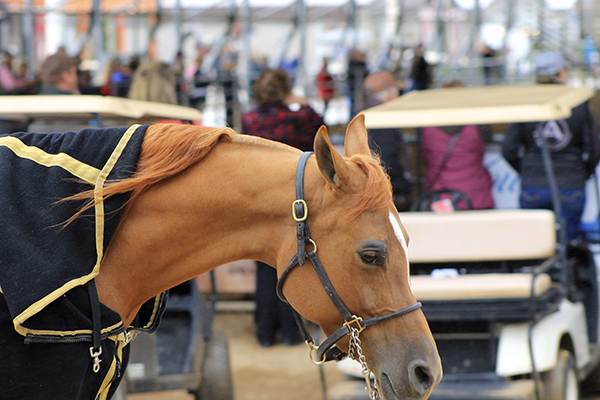Fall Equine Wellness: What Your Horse Needs
Administer booster vaccinations and target deworming treatments to help protect your horse’s health.
With fall approaching, it is important that you help protect your horse from emerging risks, such as equine influenza virus, equine herpesvirus (EHV) and parasites.
“If you have a horse that travels for fun or competition, it’s recommended that he be vaccinated twice a year against equine influenza and equine herpesvirus to help boost his immunity,” said Kevin Hankins, DVM, senior veterinarian, Equine Technical Services for Zoetis. “For horses at increased risk, I always suggest they booster Fluvac Innovator in the fall.”
While annual spring vaccinations help offer disease protection and can activate an immune response, the American Association of Equine Practitioners (AAEP) vaccination guidelines recommend at-risk horses be vaccinated for equine influenza and equine herpesvirus, also called rhinopneumonitis, every six months.1
How do you know whether your horse is considered at risk? Key disease risk factors include:
- Younger than 6 years old
- Older than 15 years old
- Stabled in boarding barns
- Traveling off-property or housed with horses that do
Watch this video to learn whether your horse may need a booster vaccination.
It’s important to be aware of emerging disease risks during the fall months, which can include equine influenza virus and equine herpesvirus. Equine influenza is one of the most common respiratory diseases in horses, spreading by aerosol transmission (coughing or sneezing) from horse to horse in distances as far as 50 yards.2 Like humans with a cold, horses may experience dry cough, nasal discharge, fever, depression and loss of appetite.
Clinical infections of equine herpesvirus are most commonly seen in weanlings, yearlings and young horses entering training or those exposed to other horses through boarding or transport. Equine herpesvirus poses severe risks, including respiratory infection as well as abortion, birth of weak, nonviable foals, and can lead to sporadic neurologic disease.3 Equine influenza and equine herpesvirus can lead to costly veterinary bills and increased days out of the saddle, making it all the more important to help safeguard your horse’s health with an effective, trusted vaccine.
Fluvac Innovator® vaccines are the most trusted equine influenza vaccines and help provide your horse with broad protection against newly emerging and conventional equine influenza virus strains as well as equine herpesvirus (EHV‑1 and EHV‑4).4-10 Zoetis regularly tests Fluvac Innovator to ensure its vaccine continues to be effective against emerging EIV isolates. For additional peace of mind, Fluvac Innovator is backed by the Equine Immunization Support Guarantee.
Equine influenza and equine herpesvirus aren’t your horse’s only threats this fall — enter parasites.
Fall is a key time for equine deworming in many parts of the country. Parasite transmission decreases with cold weather and the conclusion of grazing season. Key parasites to target with fall deworming include tapeworms and bots. Horses may harbor tapeworm infections without showing signs of discomfort; however, the parasite can cause colic — from mild to severe colic episodes requiring surgical treatment.11
The AAEP recommends tapeworm treatment once a year, in the late fall or early winter.12 Quest® Plus Gel is the ideal deworming choice for late fall as it treats and controls bots, encysted small strongyles and roundworms in a single dose. Quest Plus also contains an additional active ingredient – praziquantel – that specifically targets tapeworms.
To ensure protection for your horse, work with your veterinarian to identify fall booster vaccination and deworming needs. Keep your horses healthy, and save up to $8 per horse with this fall coupon when you use Zoetis equine vaccines and dewormers.
Do not use Quest Gel or Quest Plus Gel in foals less than 6 months of age or in sick, debilitated and underweight horses. Do not use in other animal species, as severe adverse reactions, including fatalities in dogs, may result.
Keep your horses healthy, and save up to $8 per horse with this fall coupon when you use Zoetis equine vaccines and dewormers.
About Zoetis
Zoetis is the leading animal health company, dedicated to supporting its customers and their businesses. Building on more than 60 years of experience in animal health, Zoetis discovers, develops, manufactures and markets veterinary vaccines and medicines, complemented by diagnostic products, genetic tests, biodevices and a range of services. Zoetis serves veterinarians, livestock producers and people who raise and care for farm and companion animals with sales of its products in more than 100 countries. In 2016, the company generated annual revenue of $4.9 billion with approximately 9,000 employees. For more information, visit www.zoetisUS.com.
1 The American Association of Equine Practitioners. Risk-Based Vaccination Guidelines. Equine Influenza. https://aaep.org/guidelines/vaccination-guidelines/risk-based-vaccination-guidelines/equine-influenza. Accessed August 15, 2017.
2 The American Association of Equine Practitioners. Suspected Case of Contagious Infectious Respiratory Disease. https://www.vetstream.com/treat/equis/pdfs-and-tables/respiratory-disease-guidelines. Published 2006. Accessed August 15, 2017.
3 The American Association of Equine Practitioners. Equine Herpesvirus (Rhinopneumonitis). https://aaep.org/guidelines/vaccination-guidelines/risk-based-vaccination-guidelines/equine-herpesvirus-rhinopneumonitis. Accessed August 15, 2017.
4 Data on file, Study Report No. 15EQRGBIO-02, Zoetis Inc.
5 Data on file, Study Report No. 671-02-001.R, Zoetis Inc.
6 Data on file, Study Report No. 671-08-004.R, Zoetis Inc.
7 Data on file, Study Report No. 766-09-002.R, Zoetis Inc.
8 Data on file, Study Report No. 10OREQBIO-01, Zoetis Inc.
9 Data on file, Study Report No. 14OREQBIO-1, Zoetis Inc.
10 Data on file, MDI sales data for West Nile-Innovator and Fluvac Innovator as of 12/31/16, Zoetis Inc.
11 American Association of Equine Practitioners. Internal Parasites: Strategies for Effective Parasite Control https://aaep.org/horsehealth/internal-parasites-strategies-effective-parasite-control. Accessed August 15, 2017.
12 American Association of Equine Practitioners. AAEP Parasite Control Guidelines https://aaep.org/guidelines/parasite-control-guidelines. Accessed August 15, 2017.
All trademarks are the property of Zoetis Services LLC or a related company or a licensor unless otherwise noted.
© 2017 Zoetis Services LLC. All rights reserved. FLU-00114











